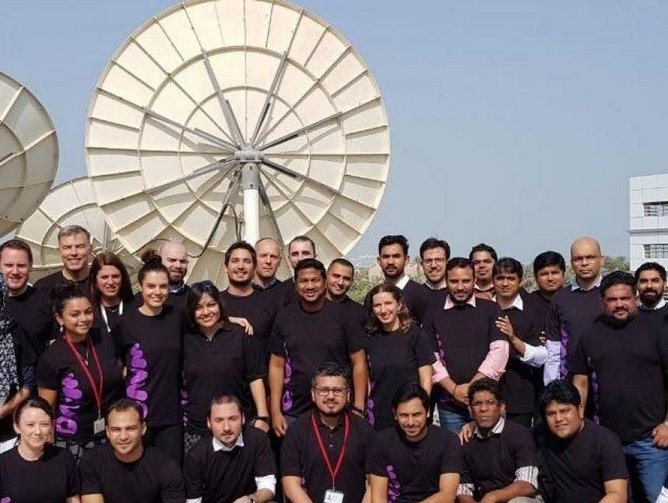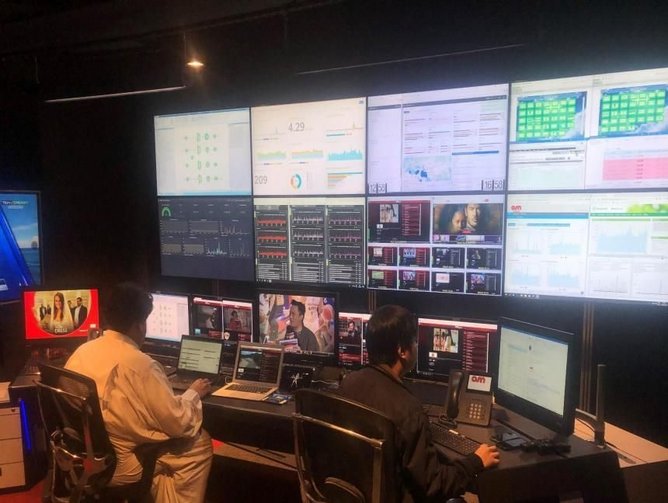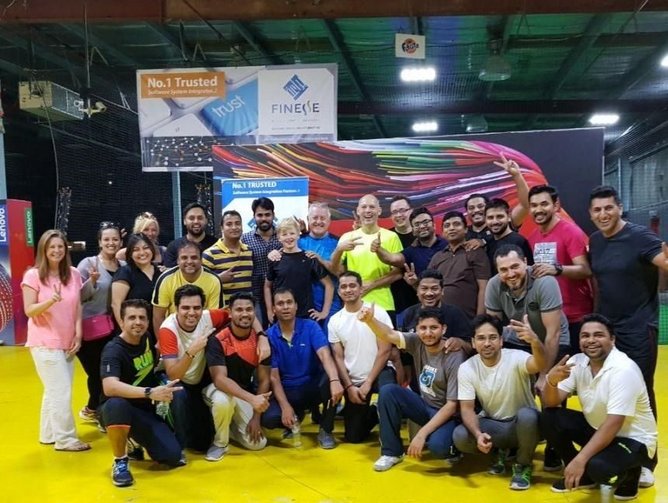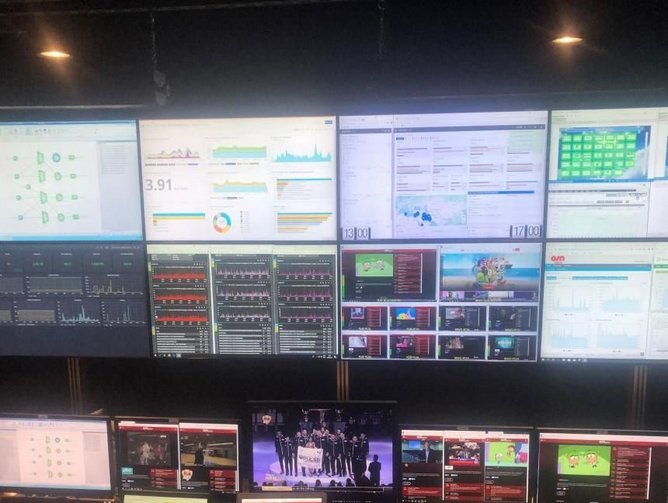OSN has embraced digitisation to transform the customer viewing experience
The MENA region is quickly becoming recognised as one of the world’s largest TV markets. Impacted by ongoing demands across GCC countries, the transition towards digital broadcasting is creating new opportunities on a global scale. Owned and operated by Panther Media Group and registered in the Dubai International Financial Centre (DIFC), Orbit Showtime Network (OSN) has more than 150 channels, as well as exclusive and on-demand content on offer.
OSN is at the forefront of digital innovation, where it has remained steadfast in cementing its position as a leader in the delivery of premium, world class content. Leading its digital shift is Chief Digital Officer, Jacques von Benecke, who has sought to embrace new technologies, implement new initiatives to reflect local demands, and develop long-term partnerships with major studio trailblazers such as Disney, HBO, NBC Universal, Fox, Paramount, MGM, Sony, DreamWorks and more. “The culture change that we have to go through is quite dramatic. We haven't won that battle yet, but we're getting there a little at a time,” he says. Taking the business on its digital transformation journey, von Benecke is passionate about driving enormous change across the industry.
“Broadcasting is generally a very slow changer and they really don't like adopting new technologies, but the opportunity to change is really, really big,” he reveals. Upon being appointed in June 2017 to lead innovation initiatives and set up an overall innovation function, the first thing von Benecke sought to implement was a cloud strategy and an essential enterprise architecture. While he admits that the business was originally reluctant to broadcast content in the cloud, as well as automating a number of internal processes, his past experience working with JourneyOne to develop effective digital transformation tool Jibility enabled von Benecke to utilise its methodology and onboard new technical capabilities.
“Digital transformation is not just about the technology and the process that you change, but also about changing the organisational culture. Jibility is a simple tool for developing a business or digital strategy roadmap in a quarter of the time. The tool helped me to effectively model our digital transformation,” he explains. “As we move along our business transformation things change, and normally changing plans can be a real problem. Jibility’s six step process and reuse library makes capability-based planning easy, and enables me to have a new business model within hours. Jibility strategy roadmaps is a highly visual bridge between our strategy vision and implementation plan that I often use to get consensus on new costs and the timeline, it's just fantastic.”
Cloud enabled
Switching from on premise platform fashioned in-house to relocating its platforms in the cloud, OSN has bought increased responsiveness across all its business functions. Its recent partnership with SnapLogic will also ensure its hybrid cloud architecture is maintained and data can remain available, while seeing the business gain increased agility in responding to evolving customer requirements. “If we give customers a dire experience they walk away. This is the big difference between satellite customers and digital customers. Digital customers are very unloyal because within two clicks they can sign up to Netflix or Amazon. Satellite customers are loyal because it's a pain to change your satellite subscription,” adds von Benecke. Gaining an acute awareness of customer behaviour, age groups, and the way customers consume content, OSN has sought to fully transform the customer experience. New digital tools will deliver increased reliability, scalability and improve performance across its channels, which will filter into its aim to deliver value-added services at every stage. “Underlying technology platforms are getting more stable by moving into the cloud. We are now focusing on how we can change consumer habits and the customer experience when they interact with our content,” he explains. “Customers want everything now, on every device, for free. Here, we struggle with internet adoption and digital payments. Credit cards and debit cards are not widely used in the middle east where cash is still king, and people assume everything's paid by credit card. It’s all about balancing that with how careful we have to be about what we broadcast. It's the complexity of the challenge that excites me.”
Heavily reliant on local telco infrastructures across the Middle East, emerging markets such as Egypt and Jordan as well as North African emerging markets, from Algeria to Morocco present ongoing challenges, with 2G networks still in operation. “Dubai, for example, is significantly advanced, but in Saudi Arabia it is a very different story – and the two are neighbours. A large part of the region tries to copy Dubai, but it depends on how wealthy the country is and how conservative the culture is,” observes von Benecke. “Saudi Arabia is by far the strictest, where they are only starting to allow cinemas back into the country. They have concerns regarding the type of entertainment people can access, so proactively monitor this the entire time.”
However, such a diverse customer base has no doubt presented significant challenges, leading OSN to look towards technology to not only drive increased efficiencies and enable further cost savings, but also to support its efforts to remove content which would not meet the standard of each country. Partnering with Amazon, the business has utilised machine learning to develop Alexa Language Helper, where natural language processing has been embedded to recognise voice, turn it into text and enables the removal of content such as nudity, as well as conversational topics which would prove undesirable.
“We’re also working with GreyMeta regarding a product that can view our content and screen it for all the legal compliance that we have to look out for. There are a lot of complexities around what is acceptable content in each country. Some of it is legal, some of it is cultural, some of it is religious, and so it's a very fine line that we have to tread,” he says. “By building a platform with the use of Google Machine Learning and GreyMata, we are doing some really interesting things.”
At customer’s fingertips
Overhauling both its front and back-end capabilities, the introduction of a private blockchain has seen OSN utilise smart contract technology with local content providers, enabling customers to go online, register to become a content provider and create a smart contract on Ethereum blockchain. Customers can then submit content, while OSN will curate and scan it to ensure it is acceptable to distribute. “As people consume it, we essentially write records into this immutable ledger, and as the provider of the content, customers can see who's viewed the content, the time it was viewed, how long for and on what device,” states von Benecke.
“By developing our own cryptocurrency to support this, we have disconnected it from a legal monetisation value, which allows us certain flexibility with short form content. Every time somebody watches, we'll provide one coin, whereas if long form content is provided, such as a movie, this is far more valuable and we'll maybe give customers 100 coins. This can be turned into money or credit to upgrade services, gain access to our editing suite and more. We can use blockchain as a barter system.”
Looking to advance this further, OSN will look to develop this as a basis for a rewards system. If customers buy a family subscription, for example, a blockchain will be created for the whole family, providing trust and increased security with regards to customer data. It will also work to provide increased transparency with partners, such as Disney and HBO.
“Every time somebody views our content or we air it on a live channel, we have to record how many people are viewing it to pay our licensing fees. If we use a blockchain, that data is immediately there. Studios can look at the ledger and know where we are, so at the end of the year there's none of this forwards and backwards negotiation about licensing numbers.”
As the industry increasingly moves away from satellite, the company is looking to TVKey from Nagra. Replacing traditional satellite boxes with a USB stick, it will cater to the growing demand for digital streaming services. “Rather than having to battle with two or three remotes, we'll just take over your TV and say, ‘here's the OSN service in your TV’ or ‘here’s the Netflix content in your TV,’ and you can drive it all with one remote, or by voice, as new TVs are going to be voice activated,” adds von Benecke.
With a plethora of digital tools on the market, access to visual content anytime, anywhere continues to fuel the need for products and services which are not only secure and robust, but increasingly diverse. Partnering with transcoding leader Bitmovin has afforded OSN the ability to make its services accessible via tablets, iPads and more, without losing any form of quality across its digital applications.
“Bitmovin take our movies, undertake all of the encoding and condense files to be as small as possible without losing quality, so it can stream even on a low internet speeds. In this region, we struggle so much with internet and mobile connection, and Bitmovin have the best technology and use machine learning to find the best compression ratio. They look at each frame. If it changes a little, they apply a much higher compression ratio, and if things change a lot, they would compress that frame only a little. With this variable compression they maximise the reduction in file size, without reducing any of the quality,” he explains.
For sports content in particular, use of augmented and virtual reality technology (AR and VR) is also picking up speed at OSN. Working alongside Microsoft with HoloLens to look at adopting similar tools within its sales channels, customers can experience the differences between high definition content and standard quality content. “The platform is basically three screens which reflect the different qualities of content we have available. You can also access augmented reality through the platform, where we would see sports people that are in the match and the recent statistics for those sports people: how many wins, how many loses, etc. It's probably going to become much more of a reality next year, where we will work with companies that have 360-degree videos to allow customers to change the angle of what they're viewing. Following on from things like Netflix’s Bandersnatch, where you can change the path of the movie to different endings, and thus deliver a complete personalised experience, it’s a very exciting time.”
By exploring new innovations to transform the digital experience, von Benecke has also spearheaded OSN’s ambitions to overhaul outdated ways of working and promote cross collaboration across the business. Responsible for facilities management and building management, OSN’s working spaces have been redesigned, with ‘tribes’ of people with similar skills or complementary skills bought together to drive each area of the business, leading to a number of advantages.
Content variety
OSN remains renowned for its diverse content, its focus on the customer and its strong partnerships with leading studios. However, although it has advanced significantly by bringing experts on board to support its modernisation, the introduction of Saudisation has presented several challenges. Moving away from westernised content, the company has turned its attentions towards launching more Turkish and Arabic content, as well as new genres and content for women and children to become increasingly inclusive and cater to the needs of local citizens.
“From a technology point of view, with the adoption of 4G and 5G we are going to have a customer base that is going to shift increasingly into digital. Investing in the cloud and building new platforms will help us navigate this,” adds von Benecke. “If something innovative is coming out, we want to remain at the forefront. We have new partnerships with Discovery and Netflix, we're the first (and only) company in the world to put the Netflix application on our satellite boxe – you could argue that in itself is a very big digital transformation.”
Looking towards the future OSN would like to personalise and localise its recommendations to our customers. Turning towards innovative startups such as Covatic, who are “doing amazing things” will see the business gain the ability to run machine learning algorithms on mobile devices to deliver the next level of information regarding how customers interact with OSN’s content and its digital platforms while on the move. “Integrating this information with what customers like to watch while they are traveling between meetings or on their daily commute, we can make sure users don’t waste their precious time searching for videos to watch, we will have them pre-downloaded and ready for you,” explains von Benecke.
“We're not afraid to compete with Netflix. Netflix may have all the Netflix originals, but we have live, linear channels. We have real TV on our TV platforms, not just video. We cater for a much wider age range. There are a lot of people who prefer to watch the news on their particular news channel and watch it at a very specific time, rather than watch video content. I would say that the company would like to go down that direction where we address a wider audience and provide an increasingly digital focus.
“We can now start focusing on the customer experience, on the technology and on the content. We are changing from relying on sport and western content to having a completely different content focus. Although customers haven't seen it, these changes have gone on and they are really going to feel the difference.”





